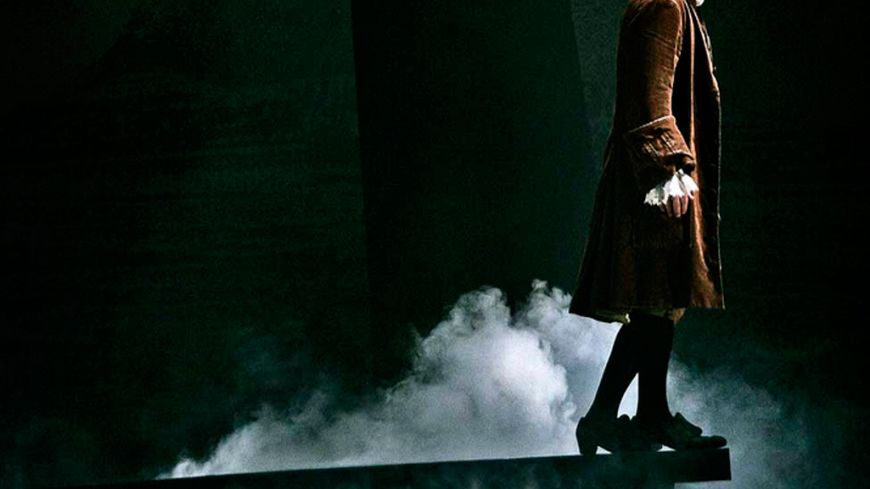
Confessions of a Justified Sinner is based on James Hogg’s novel written in 1824, The Private Memoirs and Confessions of a Justified Sinner, which is set in pre-Enlightenment Scotland and tells the tale of Robert Wringhim, a religious man who believes in predestination.
Following Calvinist creed, he believes he is one of "the elect" on a fast track to heaven, no matter what he does. When a strange character called Gil-Martin appears, his life and his morality is questioned as he yields to temptations with the "knowledge" that he is above punishment.
Behind a foredrop showing a dark and clouded sky, an eerie red light shines and a howling wind blows through the auditorium. We were being warned. It is a cold, Edinburgh night with the low fog swirling as two members of Lothian and Borders Police make a strange find: a strangely clad and remarkably intact corpse with a book The Private Memoirs and Confessions of a Justified Sinner.
With giant and highly symbolic monoliths revolving round the stage, we find the history of Robert Wringhim, who describes himself as an outcast, with his nun-like mother, his severe and sanctimonious "adoptive" father, his worldly "real" father, his new lively wife and vibrant half-brother.
Amid the towering stones appears the mysterious Gil-Martin as a dopplelganger of young Wringhim. Is he real? He seems so to Wringhim.
Is he the devil incarnate? He is referred to as Prince and he has the ability to metamorphose into any shape he chooses.
Is he a figment of Wringhim’s imagination? Who knows?
What is clear is that he is seductive. He can tempt young Wringhim from being steeped in the ‘riches of scriptures’ to raising the ‘sword of God to lay to rest unholy’ with impunity.
At the age of 18, Wringhim, through the power of his Reverend parents' prayer, became one of the Elect, embracing their dreich dangerous and righteous beliefs. With Gil-Martin’s influence, he goes through the gamut of sin eventually awaking in brocade as laird following his brother’s murder.
His arrogance is unbowed even in the face of the humbling secular humanity of a poor couple who give him shelter asking when he prays to God “Have ye nae freen nearer at hand?” or when his servant Samuel Scrape tells the salutary Auchermuchty tale.
But it is his sad remains that have turned to bones at the end of the play as we are returned to the bizarre crime scene so maybe at last humanity won out.
It was a pleasure to hear the Scots language used to good effect in much of the dialogue and the research that went into the production of the magnificent costumes was evident.
This is a powerful, compelling piece of theatre whose message against bigotry and self righteousness resonates strongly today.
Times: 16 October - 7 November, 2009

